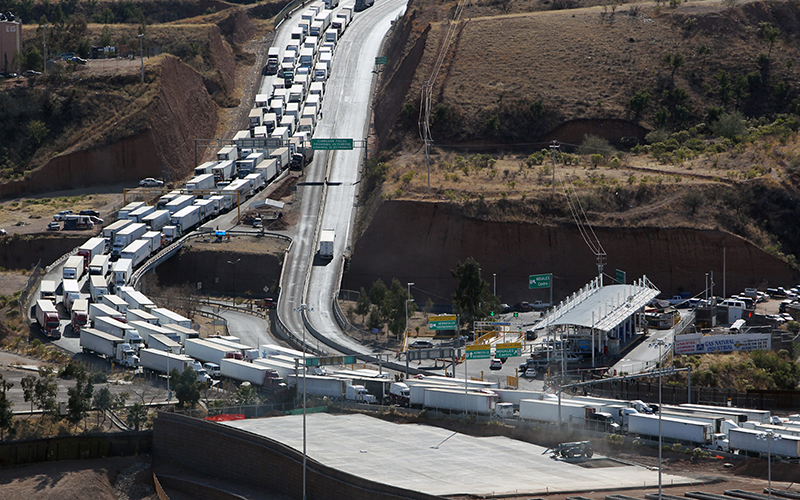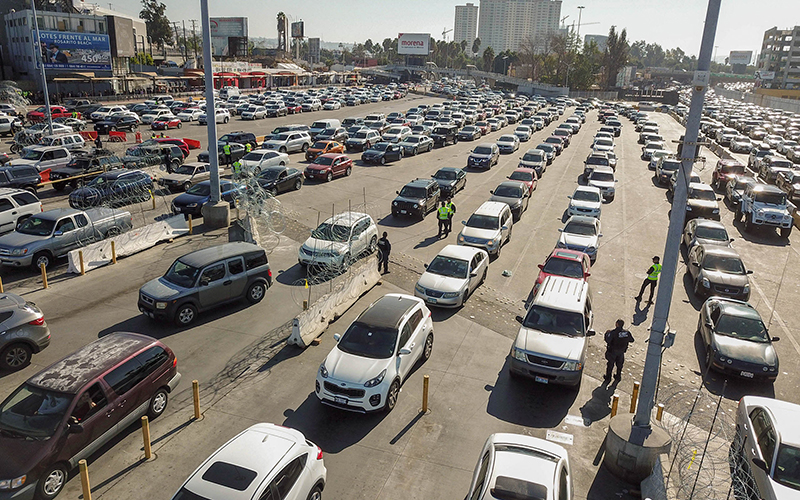
Trucks line up in Mexico to enter the U.S. through the Mariposa Port of Entry near Nogales in this photo from 2011. Customs and Border Protection recently trimmed hours at the port in order to redeploy workers elsewhere on the border. (Photo by Donna Burton/U.S. Customs and Border Protection)
WASHINGTON – Customs and Border Protection said it is stopping Sunday inspection of commercial trucks at Nogales in order to shift officers elsewhere on the border, sparking an outcry from produce companies who fear damage to the time-sensitive industry.
The cut comes as the Trump administration has ordered CBP to redeploy 750 officers from ports of entry so they can help Border Patrol agents respond to a surge of immigrants at the southern border.
But business officials said Tuesday that CBP officers are needed at ports of entry, where they can process legal products efficiently and intercept illicit goods. That position was echoed Tuesday in a letter to CBP from Arizona Sens. Kyrsten Sinema and Martha McSally, who said that “reducing port staffing harms security and our economy.”
“Arizona’s ports play a critical role in preventing narcotics and other illegal goods from entering the country,” said a statement from Sinema’s office on the letter. “Staffing reductions will hurt the agency’s security mission and make Arizona’s families and communities less safe.”
Lance Jungmeyer, president of the Fresh Produce Association of the Americas, said diverting officers has caused “lane closures, delays, disruptions to trade flows, and increased shipping costs.”
“All of this will negatively impact the U.S. economy while leaving our ports of entry more vulnerable,” Jungmeyer said in a statement.
The change was announced Friday in a CBP bulletin to businesses that use the Mariposa Port of Entry at Nogales. While Sunday hours there were already shorter than other days, and only offered during the produce high season, CBP said they would be cut entirely beginning April 7 because it is facing “an unprecedented humanitarian and border security crisis.”
The bulletin said that “ports are realigning their workforce and limiting or discontinuing some services” in order to minimize the impact on legitimate trade and travel.
The news is part of a flurry of border-related concerns sparked by President Donald Trump’s threat last week to close the U.S.-Mexico border and cut off aid to Central American countries in hopes of forcing them to stem the migrant problem where it starts.
Critics said a border shutdown between the U.S. and its third-largest trading partner would be an “economic disaster.” Trade between the two countries was just under $616 billion in 2017, according to the Office of the U.S. Trade Representative. Trade between Arizona and Mexico was worth $16.7 billion in 2018.
Trump acknowledged the economic impact of closing the border, but claimed Tuesday that the mere threat has already had an effect.
“Mexico, as you know, has as of yesterday started to apprehend a lot of people at their southern border,” he said. “They’ve literally apprehended thousands of people. And it’s the first time really in decades that this is taking place.”
Despite that, he said he is “ready to close it (the border) if I have to” and that the economic impact would be a consideration, but “security is most important.”
Guillermo Martinez, general manager for Wilson Produce, called Trump’s threats “a lot of talk,” but said the consequences of a closed border would have “tremendous” effect. Even shutting down Mariposa on Sundays will mean “orders not being filled on time,” he said.
“Produce is a very perishable item, so we have to have a very timely chain of logistics. Having this day taken away from us basically prevents us from filling the orders on time,” said Martinez, whose business is in Nogales.
Martinez said closing the Mariposa crossing on Sundays will have a ripple effect on the produce industry in Nogales.
“It can basically put probably 10 to 15 trucks, that we should have that Sunday, back to Monday,” he said. “You’re basically doubling the shift and the work for Monday.”
That, in turn, will affect grocers and consumers, he said.
“By the time it hits (shelves), it could be produce that is no longer good for consuming,” Martinez said.
The cuts comes to an agency that was already understaffed, said Martinez, adding that the produce industry has long asked CBP for “more boots on the ground.” That was echoed by the president of the union that represents CBP officers.
“We’ve been urging Congress for years to increase CBP staffing at the ports,” said a statement from National Treasury Employees Union President Tony Reardon. “Yet there are still 1,600 CBP Officer vacancies and funding is needed to hire an additional 1,900 to meet the agency’s own workload staffing model.”
Those shortfalls were slowing traffic at the ports even before it was announced that officers would be shifted to border duty, Reardon said. But he added that CBP officers are “answering the call to duty” and “they have our support.”
Sinema and McSally wrote in their letter that they “understand the challenges that CBP faces with the recent influx of migrants,” but that “different options must be explored” to combat the surge.
Martinez said that whatever happens, he hopes it does not harm the produce industry.
“The industry has been here for a long, long time, and commerce between Mexico and the U.S. has really brought up a lot of good product and good produce to U.S. consumers,” he said.
Connect with us on Facebook.
AlertMe
